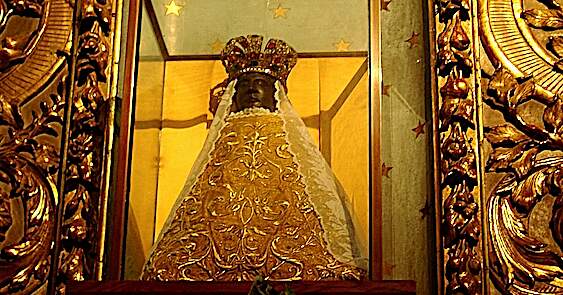
Mende, in the department of Lozère and of the region of Occitanie in southern France, really has all the marks of an ancient holy site: a Black Madonna in a cathedral built on top of a pre-Christian temple, a second Black Madonna at a well, a sacred mountain with a cave (la Grotte du Mont Mimat) to which annual pilgrimages are still held. No wonder the Queen of Mende’s altar, like that of many Black Madonnas, bears the inscription “privileged altar”. Special graces are given here.
Tradition says that the statue of the Virgin was brought to Mende from the Middle East between 1212 and 1222 by the bishop and crusader Guillaume de Peyre. Her first mention in historic documents is from 1249. Another church document from 1857 lists the relics embedded in her back: “some hairs of the Virgin Mary, pieces of her clothing and her tomb, fragments of the true cross, as well as of saints Peter, Paul, Andrew, Martial, Dennis, and James.”
She was saved from Protestants and Revolutionaries by courageous church ladies who risked their lives for her. It was during the Wars of Religion that she lost baby Jesus and her hands. Her survival was celebrated with a solemn coronation in 1894 on August 15th, the feast of the Assumption of Mary into Heaven, a national holiday in France.
Fifty years later World War II was raging. A notice on the wall of the cathedral tells this story: On the eve of the 50th anniversary of Our Lady’s coronation, in 1944, Mende was occupied by two thousand Germans. During the traditional August 15th procession in honor of the Queen of Heaven, something of a political nature happened around Mende that normally would have had tragic consequences. In desperation the guardian of Notre-Dame put the city under her protection and promised to celebrate the 50th anniversary of her coronation with all the pomp and circumstance it deserved as soon as it would be safe to do so. Two days later the city was intact and not a single German was left in it. After the war, on August 18, 1946, this miracle and her coronation were commemorated with a triumphant celebration.